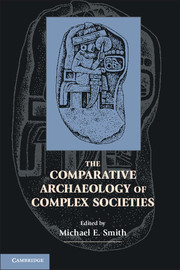Book contents
- Frontmatter
- Contents
- Tables
- Figures
- Contributors
- Foreword
- Preface
- Chapter 1 Comparative Archaeology
- Chapter 2 Approaches to Comparative Analysis in Archaeology
- Chapter 3 Comparative Frames for the Diachronic Analysis of Complex Societies
- Chapter 4 What It Takes to Get Complex
- Chapter 5 Challenges for Comparative Study of Early Complex Societies
- Chapter 6 Patterned Variation in Regional Trajectories of Community Growth
- Chapter 7 The Genesis of Monuments in Island Societies
- Chapter 8 Power and Legitimation
- Chapter 9 The Strategies of Provincials in Empires
- Chapter 10 Household Economies under the Aztec and Inka Empires
- Chapter 11 Low-Density, Agrarian-Based Urbanism
- Chapter 12 Archaeology, Early Complex Societies, and Comparative Social Science History
- Index
- References
Chapter 4 - What It Takes to Get Complex
Food, Goods, and Work as Shared Cultural Ideals from the Beginning of Sedentism
Published online by Cambridge University Press: 07 October 2011
- Frontmatter
- Contents
- Tables
- Figures
- Contributors
- Foreword
- Preface
- Chapter 1 Comparative Archaeology
- Chapter 2 Approaches to Comparative Analysis in Archaeology
- Chapter 3 Comparative Frames for the Diachronic Analysis of Complex Societies
- Chapter 4 What It Takes to Get Complex
- Chapter 5 Challenges for Comparative Study of Early Complex Societies
- Chapter 6 Patterned Variation in Regional Trajectories of Community Growth
- Chapter 7 The Genesis of Monuments in Island Societies
- Chapter 8 Power and Legitimation
- Chapter 9 The Strategies of Provincials in Empires
- Chapter 10 Household Economies under the Aztec and Inka Empires
- Chapter 11 Low-Density, Agrarian-Based Urbanism
- Chapter 12 Archaeology, Early Complex Societies, and Comparative Social Science History
- Index
- References
Summary
The majority of chapters in this volume consider ancient and modern societies at their most developed stages, with a particular focus on chiefdoms and states. In this chapter, I look back into prehistory to examine the individual cognitive and social capacities manifested in human societies before the development of institutionalized political hierarchies. As Kyle Summers (2005:108) has observed, the last ten thousand years of human evolution has not changed gene frequencies sufficiently to account for new behavioral patterns; instead, preexisting propensities have led to the capacity of individuals to develop and adjust to new technological and social environments. Prior to ten to twelve thousand years ago, human group size was relatively small and organized along lines of kinship and affinity in which the majority of interactions were undertaken with already-known persons. In this chapter, I argue that those characteristics provided the necessary social foundation for the subsequent development of chiefdoms, states, and empires (see also Peterson and Drennan, Chapter 6).
Our species’ ability to deliberately alter the environment, create complex tools, and make choices about food consumption and goods acquisition is evident by the Upper Paleolithic period starting fifty thousand years ago. Sophisticated investments in cognition and communication were exhibited in the creation of non-utilitarian “art” such as paintings and carvings, the development of portable symbol systems in the form of durable ornamentation, and the elaboration of burial customs. These actions, undertaken by individuals in a shared rubric of cultural understanding about intent and meaning, were elaborated through continued investments in objects and fixed-place settlements. After the adoption of sedentism, the transition to social complexity was manifested in the elaboration of ritual, the emergence of permanent leadership, and the specialization of economic inputs. Decisions exercised by individuals about actions at the household level continued even after the development of institutionalized political hierarchies, a factor that underwrote the capacity of elites to achieve large-scale outcomes through the appropriation of some food, the control of some goods, and the cooption of some labor.
Information
- Type
- Chapter
- Information
- The Comparative Archaeology of Complex Societies , pp. 44 - 61Publisher: Cambridge University PressPrint publication year: 2011
